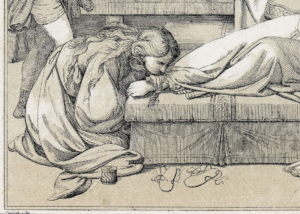 It’s a potent scene. Potent, both in terms of the permeating aroma and the raw, confronting piety Mary dotes upon Jesus. The anointing—carried in her sodden hair—contains multitudes of meaning. It foreshadows Jesus’ death, burial, and even glorious resurrection as a King. And carried in her being, is a powerful message of charity for us amid these challenging times.
It’s a potent scene. Potent, both in terms of the permeating aroma and the raw, confronting piety Mary dotes upon Jesus. The anointing—carried in her sodden hair—contains multitudes of meaning. It foreshadows Jesus’ death, burial, and even glorious resurrection as a King. And carried in her being, is a powerful message of charity for us amid these challenging times.
Mary shows that some arise with a genuine, costly charity, even in the shadows of anticipated death, betrayal, and anguish. Mind you, this scene took place a mere six days before the Passover. However faint, Mary shows her foresight to perceive that the world would pivot in six days. And with less than a week left, what does she do—what message does she leave us? That even amid uncertainty, even when but six days from anticipated calamity, even when we reside in a home once a domicile for death—the presence of Christ calls forth from us the true worship of extravagant charity.
Mary reveals she has vision and that Judas has lost his sense of smell.
Perhaps, Judas’ nose was plugged. He couldn’t smell the aroma of devotion untampered by fear of scarcity. He couldn’t see a world beyond the pivot that would take place in six days, causing him to clamp down upon any sense of supposed security within his vicinity. Lost to his self-serving interests, Judas could not perceive the glorious act for what it is. He attempted to hide his false piety (exposed in parenthesis) behind accusations of wastefulness hurled at Mary. His pretense is a foil to her genuineness.
But even when we cannot see a world beyond the next six days, perhaps we can smell the sweet aroma that is pleasing to God—the countless expressions of individual and collective charity expressed as a consequence of following the Christ who so associated, championed, and blessed people in need as to be indistinguishable from them.
Can you smell charity?
Smell the aroma of Mary’s piety that brings us to true worship of Jesus and generous service to people experiencing poverty. Smell the aroma of friend, neighbor, and stranger whose generosity extends the scope of your radical concern for our neediest neighbors. Those who recognize that we “will always have the poor with us,” not because this is God’s will, but because we have not fully embraced our responsibility for economic inequality. Those who recognize economic imbalance are the icon of our errors. We want to cast aside people with low-income, push them to the outskirts, and hide them from society’s purview. Yet, Christ, whose presence was temporarily among us in the flesh, is so associated with them as to call them perpetually to our attention.
Even when our world is pivoting, the poverty’s perpetual presence is a lament and a call to action. It laments our failure to attend to the neediest among us. Their condition is our error. And it calls us to offer up a fragrance sweet to the nose of God—the fragrance of a heart attentive to the call toward generous, costly charity. It is the aroma that unclenches fists of self-interest, opens palms in generosity, and turns us into God’s perfume to suffuse a world in great need.

